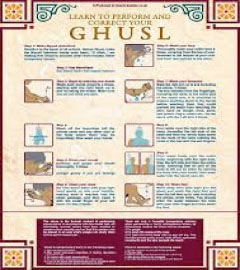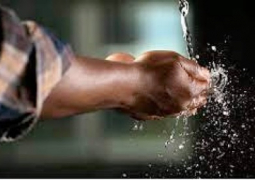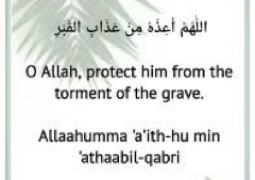
It is sufficient to perform one ghusl for both menstruation and sexual impurity, or for the Friday prayer and the ‘id prayer, or for sexual impurity and the Friday prayer, if one has the intention for both of them. This is based on the Prophet’s saying, “All acts are based on intentions.”
If a person performed post-sex ghusl but did not make ablution, the ghusl will suffice. Said ‘Aishah, “The Messenger of Allah did not perform ablution after ghusl.” Ibn ‘Umar said to a man who had told him that he performed ablution after ghusl, “You went too far.” Says Abu Bakr ibn al-’Arabi, “There is no difference of opinion among the scholars that ablution falls under the category of ghusl. If the intention was to remove sexual impurity, it also includes the minor impurities, as what sexual impurity prevents is greater than what the minor impurities prevent. The smaller one falls under the greater one, and the intention for the greater one suffices.’’
It is acceptable for a person in post-sex uncleanliness or a menstruating woman to remove their hairs, cut their nails, go to the markets, and so on, without any dislike. ‘Ata said that such people can get cupped, cut their nails and their hair, and that this is allowed even if he (or she) has not performed the regular ablution. (Related by al-Bukhari).
One may enter a public bathroom. As long as he keeps his private parts from being seen, and he does not look at others’ private parts. Says Ahmad, “If you know that everyone inside the bathroom is wearing a loincloth, you may enter. If not, then don’t enter.” The Prophet, upon whom be peace, said, “A man should not look at another man’s private parts, and a woman should not look at another woman’s private parts.” There is no problem with mentioning Allah’s name in the public baths, as mentioning the name of Allah under any circumstances is good, since there is no text prohibiting it. The Messenger of Allah used to remember Allah under all circumstances.
There is no problem in drying one’s self with a towel or other cloth after performing ablution or ghusl during the summer or winter.
It is permissible for a man to use the water left over by a woman and vice-versa. This is derived from the fact that it is permissible for them to perform ghusl from the same container. Ibn ‘Abbas narrated that some of the Prophet’s wives were performing ghusl from a container. The Prophet came and performed his ablution or ghusl from it. They said to him, “We were sexually unclean.” He said, “The water does not become impure.” (Related by Ahmad, Abu Dawud, an-Nasa’i and at-Tirmizhi, who called it hassan sahih). ‘Aishah used to wash with the Messenger of Allah from one container, and they would take turns taking water until he said, “Leave some for me, leave some for me.”
It is not allowed to bathe in the nude in front of people. It is forbidden to uncover one’s private parts. If you cover it with some clothes, it is permissible. The Messenger of Allah would cover Fatimah with a curtain when she performed ghusl. If one performs ghusl in the nude, far away from the people, it is not prohibited. The prophets Musa (Moses) and Ayyub (Job) did so, as al-Bukhari, Ahmad, and an-Nasa’i recorded.
Tayammum, the dry ablution
Definition. Literally tayammum means “aim, purpose.” In Islamic law, it refers to “aiming for or seeking soil to wipe one’s face and hands with the intention of preparing oneself to pray, and so on.”
A: Proof of its legitimacy
This is proven by the Qur’an, Sunnah and Ijma’ (consensus). The Qur’an says, “And if you are ill, or on a journey, or one of you comes from relieving himself, or you have touched women, and you do not find water, then go to high clean soil and rub your face and hands (therewith). Lo, Allah is Benign, Forgiving” (an-Nisa’: 43). From the sunnah we have the hadith related by Abu Umamah in which the Prophet, upon whom be peace, said, “All of the earth has been made for me and my nation a pure place of prayer. Whenever a person from my nation wants to pray, he has something with which to purify himself, that is, the earth.” (Related by Ahmad.) Finally, there is a consensus that tayammum forms a legitimate part of the shari’ah, as it replaces ablution or ghusl under specific circumstances.
B: Blessing from Allah
This form of ablution is viewed as a blessing from Allah to the Muslims. Jabir relates that the Prophet, upon whom be peace, said, “I have been given five things that were not given to anyone before me: I have been made victorious due to fear for a distance of one month’s journey; the earth has been made a place of prayer for me--wherever and whoever of my nation wants to pray, he may pray; and the war booty has been made lawful for me, and this was not lawful for anyone before me. I have been given permission to intercede. The prophets used to be raised for their own people only, but I have been raised for all of mankind.” (Related by al-Bukhari and Muslim.)
The reason for its legitimacy
Said ‘Aishah, “We went out with the Messenger of Allah on one of his journeys until we reached Baida’. At this place, one of my bracelets broke and fell somewhere. The Messenger of Allah and others began to look for it. There was no water at that place, nor did anyone have any water with him. The people went to Abu Bakr and said, “Do you see what your daughter has done?” Abu Bakr came to me, while the Prophet was sleeping on my thigh. He blamed me and said to me whatever Allah willed him to say. He also poked me in my side. I could not move, for the Prophet, upon whom be peace, was sleeping on my lap. He slept until the morning without any water available. Then, Allah revealed the verse of tayammum. As-Sayyid ibn Huzhain said, ‘That was not the first blessing from the family of Abu Bakr.’ The camel that I was on got up and we found the necklace underneath it.” (Related by “the group,” except for at-Tirmizhi.)
One cannot find water, or the amount one finds is insufficient for ablution
‘Imran bin Husain said, “We were with the Messenger of Allah during a journey. When he led the people in prayer, one man stayed apart. He asked him, “What prevented you from praying?” He said, ‘I need a post-nocturnal bath and there is no water.’ He said, ‘Use the soil, for it is sufficient.’’’ (Related by al-Bukhari and Muslim.)
Abu Zharr related that the Prophet, upon whom be peace, said, “The soil is a purifier for a Muslim, even if he does not find water for twenty years.” (Related by “the four.” At-Tirmizhi grades it Hassan sahih.) But before one makes tayammum, he must look for water from any posible source. If he is sure water is not to be found or it is too far away, he does not have to look for it.
One is injured or ill
If one is in this condition, and believes water will worsen it (he does not have to be absolutely sure, but may base his opinion on past experience or what a knowledgeable person has told him), he may perform tayammum. Jabir said, “We were on a journey and one of us got injured. Later, he had a wet dream. He asked his companions, ‘Can I perform tayammum?’ They said, ‘No, not if you have water.’ He performed ghusl and died. When they came to the Messenger of Allah, they informed him of what had transpired. He said, ‘They killed him, Allah will kill them. Do you not ask if you do not know? The rescue of the ignorant person is the question. He could have performed tayammum and dropped water on his wound or wrapped it with something and wipe over the wrapping, and wash the rest of his body.” This is related by Abu Dawud, Ibn Majah, ad-Daraqutni and Ibn as-Sakin, who said it is sahih.
To be continued



